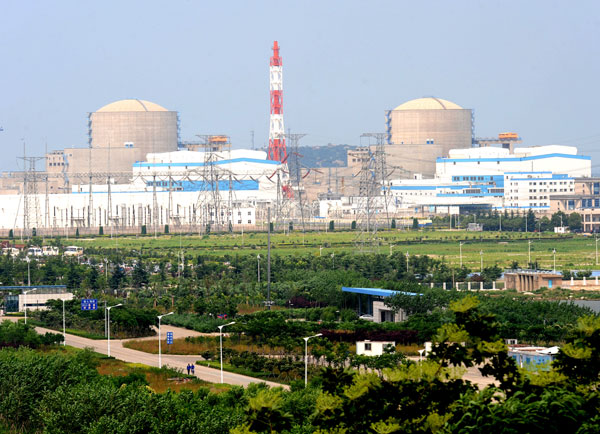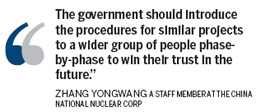Nuclear plants see powerful growth
By Wu Wencong (China Daily) Updated: 2013-09-26 09:53Safest section
The latest example of this came in July in Jiangmen, a city in Guangdong province, when residents gathered in the streets holding posters objecting to a nuclear fuel project originally planned for Heshan, a county-level city about 30 km away. The protest came about two months after an environmental activist flew into the grounds of a nuclear power station in France on a motorized paraglider.
 |
|
Tianwan Nuclear Power Station in Jiangsu province. Geng Yuhe / for China Daily |
Zhao, from the ministry, said the production of fuel elements is the safest section of the entire nuclear power production line, with fewer risks than those from nearby chemical plants, while Chen said there were two reasons for the mass objection to the project.
First, the public lacked knowledge of nuclear fuel and its potential risks. Second, they were unclear about the examination and approval procedures for the project.
Residents in Heshan, where the project was originally located, reacted peacefully to it because the local government made a number of efforts to communicate with them. However, residents in Jiangmen, for some reason, were not thoroughly informed about the project details, said Zhang Yongwang, a staff member at the China National Nuclear Corp, the project's original investor.
A two-day conference aimed at promoting better public understanding of nuclear power, with participants from all levels of nuclear and radiation departments and companies, was held in Nanjing, the capital of Jiangsu province, in early September. "The government should introduce the procedures for similar projects to a wider group of people phase-by-phase to win their trust in the future," Zhang said at the meeting.
Zhang's advice may become a compulsory legal procedure for all nuclear power-related projects, as a law dedicated to nuclear safety is being drawn up.
"Articles relating to public participation will definitely be included in the law," Zhao said.
Zhai Yong, head of the law chamber of the Environment Protection and Resources Conservation Committee of the 12th National People's Congress, said the new law will regulate only nuclear facilities, focusing on safety throughout the power generating process.
"The basic principle for the law is preventing all types of pollution," Zhai said. "Every process of the operating procedure at nuclear power plants will be covered."
He said the study of the nuclear safety law was partly triggered by the huge earthquake and tsunami in March 2011, which led to a radiation leak at the Fukushima Daiichi nuclear power plant in Japan. Another reason is that China's nuclear program is getting back on track.
To date, the 10-year-old Radioactive Pollution Prevention Act is the nation's only law relating to nuclear and radiation safety. It is accompanied by seven administrative regulations and 27 departmental rules.
"The act is the first law in China to manage production in the nuclear industry. It covers not only nuclear power stations, but also radioactive ore, and the regulations regarding the safety issue are relatively simple," Zhai said. He added that an Atomic Energy Act is also being prepared, which will focus mainly on the peaceful use of atomic energy.
- Clean energy in Mideast attracts Chinese firms
- Beijing unveils clean air action plan
- China assists Pacific island countries with clean energy projects
- New cornerstone for clean energy
- Riding the clean energy boom today
- More clean energy buses to curb smog in Beijing
- Guiyang buses powered by clean energy
- Brown and Chinese consul talk clean energy and IT
- Beijing set to expand its fleet of clean-energy taxis in trial project
- China 'incredibly innovative' in many areas: Apple CEO
- City official: Guangzhou further committed to opening-up
- Jack Ma: Globalization backed by technology will cut inequality
- HNA confirms interest in ASEAN's infrastructure investment
- Comments on Xi's letter to 2017 Fortune Global Forum
- China to create more opportunities for the world: Xi
- US tax cuts impact on China two-sided: economists
- Chinese enterprises job fair to be held in Sri Lanka


















